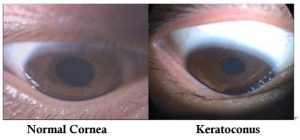Keratoconus is a non-inflammatory eye condition in which the normally round dome-shaped cornea progressively thins causing a cone-like bulge to develop. This results in significant visual impairment.
As the cornea becomes more irregular in shape, it causes progressive myopia (nearsightedness) and irregular astigmatism. At moderate to severe stage, patient will still see distorted and blurred vision when they wear glasses or soft contact lenses. Glare and light sensitivity also may occur.

Causes?
New research suggests the weakening of the corneal tissue that leads to keratoconus may be due to an imbalance of enzymes within the cornea. This imbalance makes the cornea more susceptible to oxidative damage from compounds called free radicals, causing it to weaken and bulge forward.
Risk factors for oxidative damage and weakening of the cornea include a genetic predisposition, explaining why keratoconus often affects more than one member of the same family.
Keratoconus also is associated with overexposure to ultraviolet rays from the sun, excessive eye rubbing, a history of poorly fitted contact lenses and chronic eye irritation.
Treatment an Management:
In mild stage of keratoconus, eyeglasses or soft contact lenses may help. As the diseases progresses, glasses and regular soft contact lens design will be no longer provide you an adequate correction.
The treatments for progressive keratoconus includes:
- Gas permeable contact lenses (RGP)
- Keratoconus RGP
- Hybrid contact lenses
- Corneal cross-linking (CXL)
- Scleral and semi-scleral lenses
- Intacs
- Topography-guided conductive keratoplasty
- Corneal transplant
